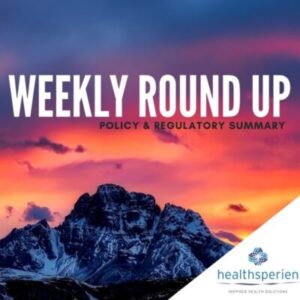Our team of experts at Healthsperien are proactively working to support your organization’s ongoing strategic objectives by providing real-time policy updates and analysis, strategic insights, legislative and regulatory advocacy.
Don’t forget to visit our Resources page and follow us on our social media channels.
HHS Secretary Releases New Data Related to 988 Lifeline
Today, the U.S. Department of Health and Human Services (HHS) released new data that shows the 988 Suicide and Crisis Lifeline (988 Lifeline) has improved response rates and capacity to connect with people in crisis. Compared to August 2021, there has been a 45% increase in overall call volume and a significant improvement in answer rates and wait times.
To build on this progress, the Substance Abuse and Mental Health Services Administration (SAMHSA) announced a $35 million grant opportunity to better support 988 Lifeline Services in tribal communities. The grant is part of the $150 million allocated for the 988 Lifeline under the Bipartisan Safer Communities Act signed by President Biden on June 25. The 988 Lifeline launched on July 16.
House Representatives Release RFI Soliciting Feedback on MACRA
Yesterday, House Representatives Bera (D-CA), Bucshon (R-IN), Schrier (D-WA), Burgess (R-TX), Blumenauer (D-OR), Wenstrup (R-OH), Schneider (D-IL), and Miller-Meeks (R-IA) released a Request for Information (RFI) on the current state of the Medicare Access and CHIP Reauthorization Act (MACRA) and associated payment mechanisms. In 2015, MACRA replaced the sustainable growth rate formula with the Quality Payment Program, consisting of a new Merit-Based Incentive Payment System (MIPS) and processes to adopt Advanced Alternative Payment Models (APMs). The Representatives note that logistical challenges have impacted MACRA almost since its inception and they are seeking feedback on actions Congress could take to stabilize the Medicare payment system, without dramatic increases in Medicare spending, while ensuring successful value-based care incentives are in place. Responses could address (but are not limited to):
- The effectiveness of MACRA
- Regulatory, statutory, and implementation barriers that need to be addressed for MACRA to fulfill its purpose of increasing value in the U.S. health care system
- How to increase provider participation in value-based payment models
- Recommendations to improve MIPS and APM programs.
Comments are due to macra.rfi@mail.house.gov no later than October 31, 2022.
Administration Action
- CMS released a Request for Information (RFI) seeking public input on accessing health care and related challenges, understanding provider experiences, advancing health equity, and assessing the impact of waivers and flexibilities provided in response to the COVID-19 Public Health Emergency. The Make Your Voice Heard: Promoting Efficiency and Equity Within CMS Programs RFI is part of the Biden-Harris Administration’s ongoing work to advance health equity and reduce health disparities. Comments are due by November 4 and can be submitted here.
- An FDA advisory panel voted 7-2 to recommend approval of an experimental drug to treat Amyotrophic Lateral Sclerosis (ALS) by pharmaceutical company Amylyx. While the FDA is not required to follow the panel’s recommendation, the move may suggest a potential approval later this month. The move was significant as the panel previously voted against approving the drug in March due to concerns of the evidence of the drug’s effectiveness. In its approval, Amylyx publicly committed to voluntarily withdrawing the drug if the current ongoing trial fails to show benefit.
Medicaid
- The Department of Homeland Security (DHS) announced that it will not consider most non-cash benefits, such as Medicaid, CHIP, and SNAP, as indicators that an individual is likely to become a public charge for immigration-related determinations. Under the Immigration and Nationality Act, non-citizens may not be allowed admission to the U.S. or approved for permanent residence if DHS determines they are likely to become a public charge, primarily dependent on the government for subsistence. This change reverses a 2019 public charge rule, which took into account use of certain non-cash public benefits including Medicaid when determining an individual’s immigration status. The rule will be effective December 23, 2022 and is anticipated to increase Medicaid and CHIP participation.
Marketplace
- CVS Health announced that they have entered into an agreement to acquire Signify Health for $8 billion, a health analytics platform and provider network. Signify Health combines in-home social and medical needs assessments with advanced analytics to help improve patient experience and assist primary care providers transitioning to value-based payment models. The purchase is subject to approval by Signify’s shareholders, though the companies report they expect the deal to close in early 2023.
Litigation
- The U.S. District Court in the Northern District of Texas issued a ruling to strike down key parts of the preventive services provision under the Affordable Care Act (ACA). Judge O’ Connor ruled that mandating coverage without cost-sharing of drugs that prevent HIV infection (PrEP) violates the religious freedom of those required to cover the drugs under the Religious Freedom Restoration Act. He also ruled that the US Preventive Services Task Force (USPSTF) violates the Appointments Clause, in that they are unconstitutionally appointed, and thus cannot wield regulatory power to require the coverage of PrEP by insurers. Finally, the Court ruled that the Health Resources and Service Administration (HRSA) and Advisory Committee on Immunization Practices (ACIP) do not violate the Appointments Clause and are empowered to require insurers to cover contraception, the HPV vaccine, and screenings and behavioral counseling for STDs and drug use.
Research
- The Commonwealth Fund published an issue brief analyzing the impact of five policies for expanding coverage and affordability after the extension of the American Rescue Plan Act (ARPA) premium subsidies from the Inflation Reduction Act (IRA). The five policies include filling the Medicaid gap in non-expansion states, reducing the employer affordability threshold, adding a $10 billion reinsurance fund, increasing the federal Medicaid matching rate in expansion states, and enhancing and funding marketplace cost-sharing subsidies. Researchers estimated the five policies would cumulatively cover 3.7 million more people in 2023. In total, the reforms would increase federal spending over 10 years by $606 billion and increase the federal deficit by $575 billion.

